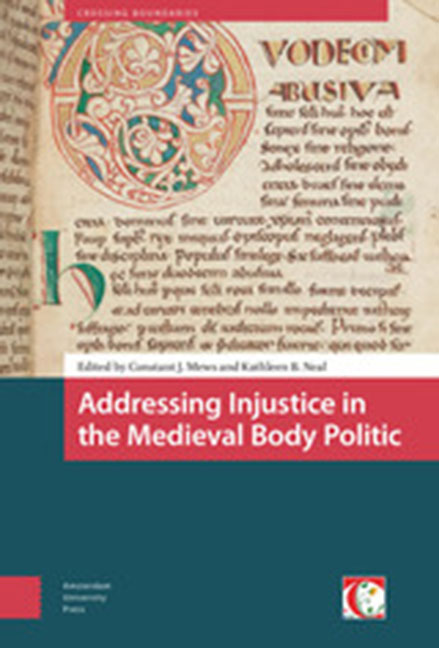Book contents
- Frontmatter
- Contents
- Acknowledgements
- Abbreviations
- Note on References
- List of Tables and Illustrations
- Introduction: Justice and its Abuse in the Medieval Body Politic
- 1 The De XII abusiuis saeculi: Contexts and Textual Traditions
- 2 The Irish Background to the De XII abusiuis saeculi
- 3 ‘Each in the Calling to Which They are Called’: Images of Authority in the De XII abusiuis saeculi
- 4 Transforming Irish Traditions: De XII abusiuis saeculi and Justice in the Frankish World, c. 750–1050
- 5 The Unjust King and the Negligent Bishop: Addressing Injustice in Eleventh and Twelfth-Century England and Germany
- 6 Reflecting on Abuses in Religious Life: From The Twelve Abuses of the Cloister to The Cloister of the Soul
- 7 Preaching the Body Politic: John of Wales and Franciscan Political Thought in the Late Thirteenth Century
- 8 Justice and Its Abuses in the Speculum justiciariorum
- 9 Addressing Abuses and Injustice in the Court of Philip the Fair: The De informatione principum of Durand of Champagne
- 10 ‘Perfect Justice Weighs Everything on a Balanced Scale’: Italian Friars on Equity, the Common Good, and the Commune c. 1270–c. 1310
- 11 Some Late Franciscan Rewritings of the Twelve Abuses
- Appendix: On the Twelve Abuses of the Age A Translation
- Bibliography
- Index of Biblical References
- Index of Manuscripts
- General Index
9 - Addressing Abuses and Injustice in the Court of Philip the Fair: The De informatione principum of Durand of Champagne
Published online by Cambridge University Press: 14 February 2024
- Frontmatter
- Contents
- Acknowledgements
- Abbreviations
- Note on References
- List of Tables and Illustrations
- Introduction: Justice and its Abuse in the Medieval Body Politic
- 1 The De XII abusiuis saeculi: Contexts and Textual Traditions
- 2 The Irish Background to the De XII abusiuis saeculi
- 3 ‘Each in the Calling to Which They are Called’: Images of Authority in the De XII abusiuis saeculi
- 4 Transforming Irish Traditions: De XII abusiuis saeculi and Justice in the Frankish World, c. 750–1050
- 5 The Unjust King and the Negligent Bishop: Addressing Injustice in Eleventh and Twelfth-Century England and Germany
- 6 Reflecting on Abuses in Religious Life: From The Twelve Abuses of the Cloister to The Cloister of the Soul
- 7 Preaching the Body Politic: John of Wales and Franciscan Political Thought in the Late Thirteenth Century
- 8 Justice and Its Abuses in the Speculum justiciariorum
- 9 Addressing Abuses and Injustice in the Court of Philip the Fair: The De informatione principum of Durand of Champagne
- 10 ‘Perfect Justice Weighs Everything on a Balanced Scale’: Italian Friars on Equity, the Common Good, and the Commune c. 1270–c. 1310
- 11 Some Late Franciscan Rewritings of the Twelve Abuses
- Appendix: On the Twelve Abuses of the Age A Translation
- Bibliography
- Index of Biblical References
- Index of Manuscripts
- General Index
Summary
Abstract The De informatione principum, written for the future Louis X (r. 1314–1316), the eldest son of Philip the Fair and Jeanne of Navarre, gives instruction on the principles of just government through reflecting on Jeremiah (23. 5): A king shall reign and shall be wise and shall execute judgement and justice in the earth. I argue that this (as yet unedited) treatise was written by the Franciscan confessor to Jeanne of Navarre, Durand of Champagne, author of the Speculum dominarum. The verse of Jeremiah establishes the need for a king to identify and fix manifold injustices in the court and society. I argue that these injustices reformulate those identified in the Twelve Abuses of the Age within the very different context of the French royal court.
Keywords: France, kingship, Philip IV, Durand of Champagne, injustice, royal court.
‘The king will reign and he will deliver judgement and justice on earth.’ This bold prophecy of Jeremiah 23. 5 (et regnabit rex et sapiens erit et faciet iudicium et iustitiam in terra) provides a guiding theme for the De informatione principum [DIP]. The Latin text of this treatise, written to instruct the future Louis X of France (1289–1316; r. 1314–1316), son of Jeanne of Navarre (1273–1305; r. 1285–1305) and Philip IV of France (1268–1314; r. 1285–1314), survives in a dozen manuscripts. DIP attracted brief attention from Léopold Delisle in the nineteenth century, who thought that it might have been composed by a Dominican friar on the evidence of a rubric in a fifteenth-century copy of the translation, but he did not study its arguments in detail. In fact, DIP shares so many themes and passages in common with the Speculum dominarum composed by Durand of Champagne, Franciscan confessor to Jeanne de Navarre, that, as will be argued here, there are good grounds for attributing both works to the same author. The treatise about the education of a prince is not just an exhortation to virtue in the model of earlier ‘Mirrors of Princes’, but an exposition of abuses that its author sees as prevailing in the royal court. This study surveys the tradition of such writing prior to DIP in order to examine how it fits into an ever-evolving tradition, comparing it in particular to that of Vincent of Beauvais on the moral education of a prince.
- Type
- Chapter
- Information
- Addressing Injustice in the Medieval Body Politic , pp. 249 - 282Publisher: Amsterdam University PressPrint publication year: 2023



